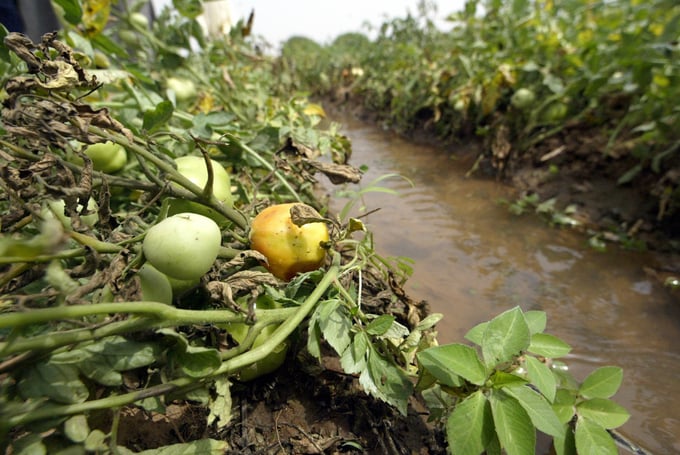May 20, 2025 | 21:12 GMT +7
May 20, 2025 | 21:12 GMT +7
Hotline: 0913.378.918
May 20, 2025 | 21:12 GMT +7
Hotline: 0913.378.918

Healthy soils store water better, and they act as carbon sinks, mitigating climate change.
At global celebrations marking World Soil Day 2023, the Food and Agriculture Organization of the United Nations (FAO) underlined the vital link between soil and water in producing our food and the need for integrated management and conservation of these key resources to enable climate change mitigation and adaptation.
“We have to produce more with less. As we strive to feed a growing population with better food, we must adopt sustainable agricultural practices that preserve and enhance soil health.,” FAO Director-General QU Dongyu said as he opened the celebrations here. “Healthy soils store water better, and they act as carbon sinks, mitigating climate change.”
Among the other participants in today’s ceremony were Olga María Pérez Tuna, Ambassador, Permanent Representative of the Republic of Guatemala to FAO , Igor L. Golubovskiy, Ambassador, Permanent Representative of the Russian Federation to FAO, Kundhinee Aksornwong, Chargé d'Affaires ad interim of the Kingdom of Thailand, Chargé d’Affaires for the United States Mission to the UN Agencies in Rome, Rodney M. Hunter, Kundhinee Aksornwong, Chargé d'Affaires ad interim of the Kingdom of Thailand, Annette Schneegans, Deputy Permanent Representative of the European Union to the UN Organization and Mary Mwale, Head of Food Security and Nutrition, Ministry of Agriculture, Republic of Kenya.
Integrated management needed
A series of events held this year, including the UN 2023 Water Conference, the Global Symposium on Soil and Water and the Rome Water Dialogue, World Food Day and the FAO Science and Innovation Forum, have shed light on the interdependence of soil and water, emphasizing the urgent need for integrated management to address the multiple interlinked challenges that we face. At the ongoing COP28 climate talks, many countries have called for urgent action to bolster water-resilient food systems.
FAO has estimated that up to 34 percent of greenhouse gas emissions from agricultural land could be offset through sustainable soil management and more judicious fertilizer management. Furthermore, sustainable water management is essential for adapting to the changing climate patterns, ensuring resilience to droughts, floods and other climate extremes that may become more frequent and severe in the future.
Soil awards presented
Today’s ceremony also included the delivery of the Glinka World Soil Prize for sustainable soil management and protection of soil resources and the King Bhumibol World Soil Day Award 2023.
This year’s eighth Glinka prize, presented by Golubovskiy, was awarded to Professor Ravendra (Ravi) Naidu. Professor Naidu is a global leader in contamination studies, who with his team at the University of Newcastle and crcCARE, has made significant contributions in soil science and management, particularly in the areas of nutrient cycling, soil formation, and soils-to-crop and soils-to-groundwater as exposure pathways for contaminants.
Professor Naidu has also spearheaded a wide range of soil management and polluted soil remediation initiatives in countries including India, Bangladesh, Malaysia, and Thailand.
The King Bhumibol World Soil Day Award 2023 was delivered by Kundhinee to the Soil and Fertilizer Society of Thailand (SFST). The SFST is a scholastic organization that brings together soil experts from government organizations, universities, the private sector, and national institutions. It played a significant role in coordinating the World Soil Day campaign 2022, entitled “Spirit of soil, spirit of partnership”, which brought the message of soils’ importance in food production to the public, young people, and as many stakeholders as possible.
SFST and its members hosted over 500 events, reaching over 150 000 people in person and over 11 million individuals through televised and radio programming.
Artistic performance
This year’s World Soil Day event also included an artistic performance on the theme of soil and water and the announcement by Laura Bertha Reyes Sanchez, the Past President of the International Union of Soil Sciences, of the winners of a book contest for children on soils and water.
In addition to the celebration in Rome, the World Soil Day is also celebrated worldwide, with 4 879 events shown on the global map demonstrating the awareness and commitment to sustainable soil management.
(FAO.org)

(VAN) Attempts to bring down the price of the Japanese staple have had little effect amid a cost-of-living crisis.

(VAN) Fourth most important food crop in peril as Latin America and Caribbean suffer from slow-onset climate disaster.

(VAN) Shifting market dynamics and the noise around new legislation has propelled Trouw Nutrition’s research around early life nutrition in poultry. Today, it continues to be a key area of research.

(VAN) India is concerned about its food security and the livelihoods of its farmers if more US food imports are allowed.

(VAN) FAO's Director-General emphasises the need to work together to transform agrifood systems.

(VAN) Europe is facing its worst outbreak of foot-and-mouth since the start of the century.

(VAN) The central authorities, in early April, released a 10-year plan for rural vitalization.